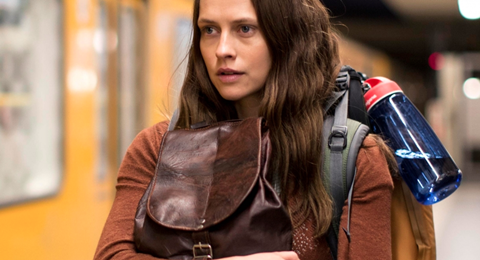Dir. Cate Shortland. Australia. 2016. 116 mins.

Australian director Cate Shortland (Somersault, Lore) takes a horror movie premise and imbues it with the knotty emotional complexity of a dysfunctional relationship psychodrama. The film is adapted from the acclaimed debut novel by Melanie Joosten about Clare (Teresa Palmer), a young Australian photographer travelling in Berlin who meets, and immediately connects with, Andi (Max Riemelt) a native Berliner she encounters on the street. But the relationship takes a darker turn when, after one thrilling night together, Clare finds herself locked in his apartment.
Palmer’s performance is daringly low-key
North American rights sold to Vertical Entertainment in advance of this film’s world premiere in the World Dramatic strand of the Sundance Film Festival; Netflix formed a key component of the low-to-mid seven figure deal and will get all rights including streaming after Vertical’s theatrical release. The quality package – the cinematography and score are both first-rate – should go some way towards countering the marketing challenge posed by its trickily ambiguous tone.
Films dealing with female imprisonment tend to take one of two approaches: either a straight-up horror film, or a psychological drama in the vein of Lenny Abrahamson’s Room. Although Berlin Syndrome has more in common with the latter than the former, this story, with its complex central relationship, comes with its own particular challenges. Not least of these is putting us inside the mind of a victim of Stockholm Syndrome who empathises with – and even desires – her captor almost as much as she longs for escape. Crucial to this is establishing the potent initial attraction between Clare and Andi. Tactile camerawork glances over skin and fleeting touches, the score pulses in anticipation as Clare reaches behind her to hold Andi’s hands. We are left in no doubt of the powerful connection between the two.
Deft visual motifs foreshadow Clare’s eventual fate – browsing on a secondhand stall, her image is caught in two mirrors, the frames evoking the bars on the door of her eventual prison. Her fascination with GDR architecture almost subliminally elicits ideas of walls and the restriction of movement. Talking about a Gustav Klimt painting that they both admire, Clare murmurs that the model is ‘hiding her deformed hand,’ little knowing that just a few days later she will be nursing her own damaged fingers.
Palmer’s performance is daringly low-key. Clare is softly spoken and introverted, sometimes to the point of inaudibility; her camera is a barrier between her and the world. Her inhibitions gradually peel away as she realises that even if she does scream, there is nobody around to hear her. As Andi, Riemelt is more problematic. The initial warmth gives way to a cold, overbearing snittiness which makes it harder for the audience to sympathise with Clare’s emotional turmoil. The suggestion that Andi has unresolved issues with abandonment by his mother is touched upon but thankfully not laboured.
The film’s main issue is a final conclusion which requires a hitherto little-seen character to make a huge leap of faith and logic, and act in a way that it is, at the very least, highly unlikely. This slightly undermines an otherwise satisfyingly taut drama.
Production company: Aquarius Films
International sales: Memento Films International
Producer: Polly Staniford
Cinematography: Germain McMicking
Screenwriter: Shaun Grant
Editor: Jack Hutchings
Production design: Melinda Doring
Sound design: Luke Mynott, Robert Mackenzie
Score: Bryony Marks
Main cast: Teresa Palmer, Max Riemelt, Matthias Habich, Emma Badings
























